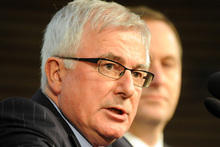Feb 19, 2014

Trade Minister Tim Groser is buoyed by the possibility of success at Trans-Pacific Partnership ministerial talks in Singapore
Even if that happens, he says a deal would not be ready to present to Parliament this year.
“It’s quite bloody exciting,” he told the Herald before his flight today to Singapore, one of 12 countries involved in the US-led talks.
“I don’t know if we are ever going to do this deal or not and if we are going to do it, whether the essential political bits will come together in the next few days, but it has the smell of reaching a moment of truth.”
But he said that even under his best case scenario, of leaving Singapore with a firm outline of the deal, “it’s not going to happen this year.”
“I would say there is almost no chance of presenting this legislation this year.”
Once the political agreement was reached, the technical detail would have to be filled out, international lawyers brought in to take out the inevitable inconsistencies in the text, and legislation drafted.
“This could take a long time,” he said.
“That’s fine by me. What I know New Zealand needs is a deal that makes sense in the long term.”
Key players the United States and Japan, the world’s biggest and third biggest economies, have been locked in negotiation in Tokyo in the run-up to the talks and the outcome of their talks would set the overall ambition of the TPP, Mr Groser said.
There was intense opposition in Japan to moving forward.
“I understand that. They are sitting behind trade barriers there are just massive in the case of rice – 700 plus per cent.”
For New Zealand it was not all that difficult, he said.
“We don’t have any real trade defensive concerns because we cleaned New Zealand out in the 1980s in terms of protection policy.
“There’s nothing that’s going to cause our team any concern.”
He was comfortable with the way negotiations on Pharmac, intellectual property, parallel importing were shaping up.
His own role would be to “come up with creative ideas off the top of my head – try and solve problems.”
For the former professional trade negotiator, the TPP negotiations were very unusual.
There was no independent chair or secretariat so no one going around should-tapping the various players to suggest ways to solve problems.
“So there is a role for coming up with creative ideas and we’re pretty good at that historically.”
Mr Groser said one of the issues for discussion by the ministers would be the fact that the United States Administration had not got Trade Promotion Authority from the Congress, which would allow a done deal to be approved or rejected, but not changed.
“We understand you need this in place to get it through the Congress but that can be done afterwards,” Mr Groser said.
It was not an ideal position but there was no reason to delay negotiations.
“No way are we going to take that negotiating position of mortgaging it to the American political process.”
Some countries held the view that the US should not negotiate without TPA but Mr Groser said US negotiators were “working the hill all the time” and understood very clearly what Congress expected.
He would raise the TPA issue with US Trade Representative Mike Froman at the start of the meeting.
“I am going to be saying to Mike Froman, my American counterpart, that New Zealand does not need
“I am suspicious of certain people who use this as an argument not to negotiate with the United States.
“It’s a ruse not to engage for other reasons and I will be making that very clear to Mike in Singapore right at the start of this meeting.
“I am not sure that every other minister will be taking that view.”
Mr Groser said it was possible that some countries could drop out of the deal.
He could think of some members of the TPP who did not have the political base domestically for further liberalisation.
“So absolutely that’s possible. Nobody wants it.”
But were it to happen, it would be more a matter of suggesting the country went back to work on support and the door would remain open for it to return at some point.
New Zealand too, would drop out if, for example, dairy products were excluded from the deal, he said.
“Not that I believe for a minute that this is other than a remote possibility but just say the negotiations were to cut out our No 1 export, dairy, for political convenience, would we be part of TPP? Hell no. We would drop out.”
Negotiations began in 2010 and ministers have become involved only since November.
Mr Groser said it would be wrong to say the Singapore meeting was a ”make or break’ meeting.
“Trade negotiations never have make or break meetings. If you don’t get there, unless there is some God Almighty upset, you just say ‘we’re not ready to do the deal, how are we going to reconstruct this? So it just gets kicked down the road
